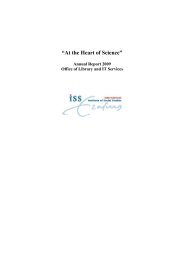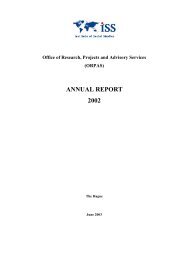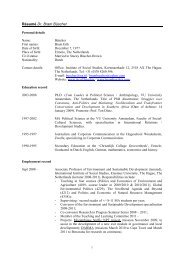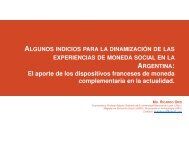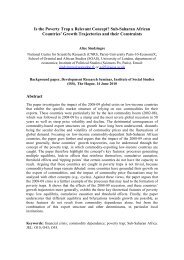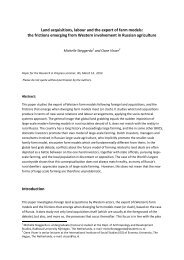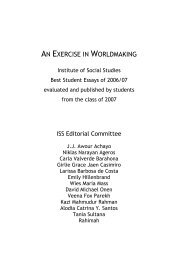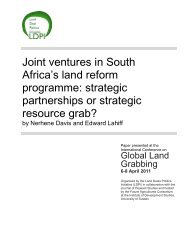AN EXERCISE IN WORLDMAKING 2009 - ISS
AN EXERCISE IN WORLDMAKING 2009 - ISS
AN EXERCISE IN WORLDMAKING 2009 - ISS
Create successful ePaper yourself
Turn your PDF publications into a flip-book with our unique Google optimized e-Paper software.
66 MEGH<strong>AN</strong> MICHELLE COOPER<br />
or political realm and the claims that individuals have a right to within a<br />
system (Dagnino 2008b: 29). In this way, citizenship can be seen as a<br />
prominent notion as well as “a crucial weapon not only in the struggle<br />
against social and economic exclusion and inequality but also in the<br />
broadening of dominant conceptions of politics” (Dagnino 2008a: 63). A<br />
relevant example can be seen through the progressive and diverse political<br />
agenda of the Anti-Privatisation Forum (APF) of South Africa.<br />
The unifying theme of the APF has essentially been against the privatization<br />
of basic community and worker needs, claiming the failure of<br />
state privatization policies not only as inefficient but also as ideologically<br />
polarizing the country (Ballard et al. 2006: 402). A movement centred on<br />
class-based ideologies, the APF is often described as anti-neoliberal, anticapital,<br />
anti-GEAR, anti-globalization, pro-poor, pro-human rights and<br />
socialist (Ballard et al. 2005: 623). Due to prevailing influences from the<br />
political right in promoting the reduction of state based capacity through<br />
privatization and the deregulation of labour, etc., many movements have<br />
been actively opposing this reorganization (Roche 2002: 74). Moreover,<br />
the context and way in which the APF operate are in direct opposition to<br />
the outcomes and nature of a capitalist society. The very claims and efforts<br />
of the APF clearly oppose their economic and structural context,<br />
placing citizenship as a key reference for imaging a new democratic<br />
arena. By opposing state economic restructuring the actions of the APF<br />
can be considered as “the survivalist responses of poor and marginalized<br />
people who have had no alternative in the face of unemployment and a<br />
retreating state that refuses to meet its socio-economic obligations to its<br />
citizenry” (Ballard et al. 2006: 402). The activities and claims of the APF<br />
suggest a fundamental reorganization of the way the state operates and<br />
who is included and participates; thus, ultimately, the APF influences the<br />
nature of the democratic arena in post-apartheid South Africa. This<br />
process becomes especially conflictual in the relatively new democratic<br />
state, where many actors have emerged with different opinions on state<br />
transition and consolidation.<br />
<strong>IN</strong>CLUSIVITY<br />
As previously stated, reconceptualizing the democratic arena involves<br />
fundamentally changing the notion of who should be included in democratic<br />
processes, considering pluralism as crucial to the many identities<br />
within a nation state. The concept of inclusive citizenship addresses this



